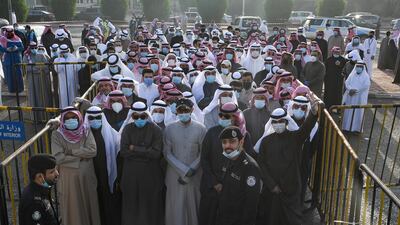Kuwait’s next parliament will comprise mostly new faces after voters returned just 19 of the 44 sitting members who sought re-election in Saturday's vote.
The new National Assembly will also be all-male despite a record number of women taking part – 28 out 322 candidates.
Turnout for the election was estimated at 60 per cent. Authorities put in place strict health precautions and set up special voting stations for people with coronavirus and those in quarantine to encourage the 567,694 eligible voters to participate.
Many voters complained that the strict health guidelines had resulted in long lines and crowded polling stations. The health ministry said a number of people were treated for fatigue, headaches or drop in blood sugar levels at clinics set up in the polling stations.
Health fears may have discouraged some voters from taking part, with turnout lower than the 70 per cent in 2016 despite some political groups deciding to end election boycotts declared in response to changes to the electoral law in 2012.
Voters were asked to choose 10 candidates each from Kuwait’s five electoral districts. Fifteen other members of the house are appointed by the prime minister.
Tribal members made strong gains in the election while opposition candidates also won more seats, reflecting a desire for change among voters during an economic downturn caused by the pandemic and low oil prices. Liberals fared poorly and many leading pro-government legislators lost their seats.
Twenty-two of the new MPs have never served in parliament, while several former members made a comeback. They include Hasan Johar, who received the highest number of votes in the first electoral district and is returning to parliament after a gap of 11 years.
Among the 19 members of the previous house who were re-elected is Adnan Abdulsamad, the longest-serving member of parliament with 11 terms since 1981.
Thirty of the newly elected members are under the age of 45.
"There is a big change in the composition of the new National Assembly," Kuwait analyst Ayed Al Manaa told Agence France-Presse.
"This an indication of the voters' anger over the performance of the previous parliament and of their desire for change in economic, health, education" and services, he said.
The polls were the first since the new emir, Sheikh Nawaf Al Sabah, took office in September after the death of his half-brother, Sheikh Sabah, at the age of 91.
Campaigning for the election was severely limited by the pandemic, with restrictions on large gatherings and public talks. Instead, this year's campaign was fought primarily on social networks and in the media.
The new parliament will convene for its first session on December 15, according to an emiri decree issued on Sunday.
Sheikh Nawaf accepted the resignation of the government submitted by Prime Minister Sabah Al Sabah on Sunday in keeping with protocol. The ruler asked the Cabinet to continue in a caretaker capacity until a new government is appointed, state news agency Kuna said.
Under the constitution a new Cabinet must be formed within two weeks, ahead of the new parliament’s inauguration.
The economy will be one of the key issues facing the new legislators and government. Kuwait is facing a record budget deficit and the International Monetary Fund expects the economy to contract more than 8 per cent this year.
According to Kuwaiti analyst Mohammed Al Dawsari, the country may witness a struggle between the new National Assembly and the government over economic legislation.
"The people were not satisfied with the performance of the previous parliament, and there are many who are calling for a comprehensive reconciliation between the government and the opposition," he said.

